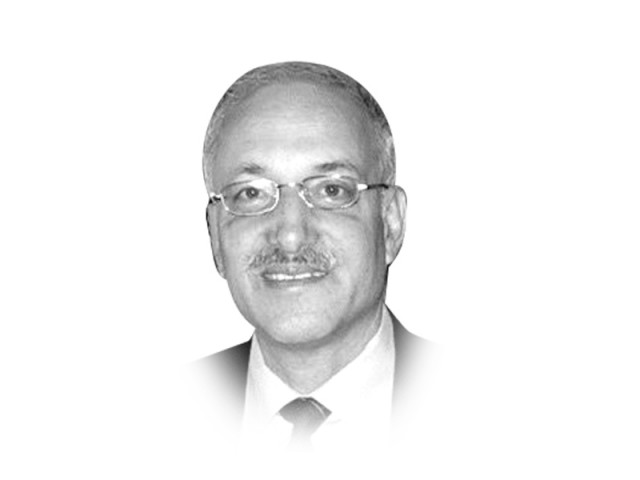Who benefits from the talks?
The only beneficiaries of the talks will be the Taliban and, in the short run, some politicians.

tariq.rahman@tribune.com.pk
The politicians certainly do not want a long-lasting peace, not because they do not like peace but because their short-sighted policies are such that it is not possible just now. Many of them are personally indebted to the militants — be it the Lashkar-e-Jhangvi, the Lashkar-e-Taiba, the Tehreek-e-Taliban Pakistan (TTP) or other non-state actors — for their ideological commitments, such as the proxy war with India over Kashmir, or in Afghanistan. Even more to the point, they are indebted to the same groups for winning their seats in south Punjab and parts of Khyber-Pakhtunkhwa and Balochistan. Some have been cowed into mental submission so they now talk about peace. What they are hoping for is to achieve some state of truce so that they can bring large numbers of people on the streets in all parts of Pakistan without the fear of their being blown up to smithereens. Also, those of them who are helped by the militants to get votes need to appease them. The Maulana will, of course, emerge as a leader of the grand jirga and it might get him the support of the independent Maliks of Fata. And let us not forget that these Maliks have replaced the old traditional tribal leaders who were killed by the Taliban. These ones will seek the TTP’s blessings in everything they do, thus strengthening the militants and the Maulana. Moreover, the only politician who challenged the hegemony of the JUI-F by venturing near the tribal areas — Imran Khan — is somehow out of the whole show, either because he was ignored or because he chose not to be part of it. But whatever the reasons for Imran Khan’s absence, it does strengthen the Maulana’s hold over the fiefdom of Fata. He may not be the lord of all he surveys but he is quite comfortably ensconced in a position of power. So, the peace talks will help the politicians — at least — temporarily.
And what do the talks achieve for the Taliban? For one thing, this is not the first time they have held such talks. Besides the agreements with the army on several fronts, the peace talks in Swat, which actually handed over that beautiful valley to them on a platter, are in living memory. The Government of Pakistan actually handed over its sovereignty to them. It conceded that it would share its monopoly on violence with a militia in violation of its own Constitution, conceded that there would be two legal systems in the country and generally showed itself to be a defeated state. Then, for reasons which are not fully known, the Taliban overreached themselves and the army decided to teach them a lesson. The military action against Mullah Fazlullah’s militia was taken with great military ability, which has still not been fully appreciated. So, if the TTP now wants peace talks, it is not a novel development. Lulls in fighting help the militants regroup, train themselves, recruit more fighters, prepare more suicide bombers (fidayeen) and lick their wounds. Not for a moment have they suggested that they would lay down their arms and, being undefeated, they can begin fighting whenever they feel they have the strength to do so. If they actually get an emirate, which is theirs de facto though not de jure, they will emerge as the beneficiaries of the talks as they did in Swat. And even if they do not, they will prove to the world that they are a centre of power that must be consulted by all those who matter in Pakistan.
What about the army? It does appear by General Ashfaq Parvez Kayani’s statements that he wants to fight the militants but needs backing by the civilian governments and the public. He even went so far as to suggest that the TTP posed a greater danger than India. This is just the sort of thing which the liberals of this country always said and the army used to call it anti-Pakistan nonsense. So, if the leopard has changed his spots, what stops General Kayani from fighting the TTP? The army has not bothered about civilian governments earlier and it has enough manipulators of the media to turn public opinion the way it desires. This actually did occur in Swat and made the public support the army action there. So, what is going on? I do not know but I have two hypotheses to offer: first, that General Kayani really feels that the public opinion will not support such an action as Imran Khan, as well as the APCs, have made the people pin their hopes on peace, and second, that there is a strong element in the army or the ISI which still feels that they need some of the militants for gaining a foothold in Afghanistan after the American withdrawal from there. In short, military policy has not really changed or its leadership does not feel strong enough to combat opinion different from it but supported by a very strong intelligence apparatus.
Anyway, the long and the short of it is that the only beneficiaries of the talks will be the Taliban and, in the short run, some politicians. And, if my second hypothesis is true, a certain point of view in our military establishment.
Published in The Express Tribune, March 7th, 2013.















COMMENTS
Comments are moderated and generally will be posted if they are on-topic and not abusive.
For more information, please see our Comments FAQ